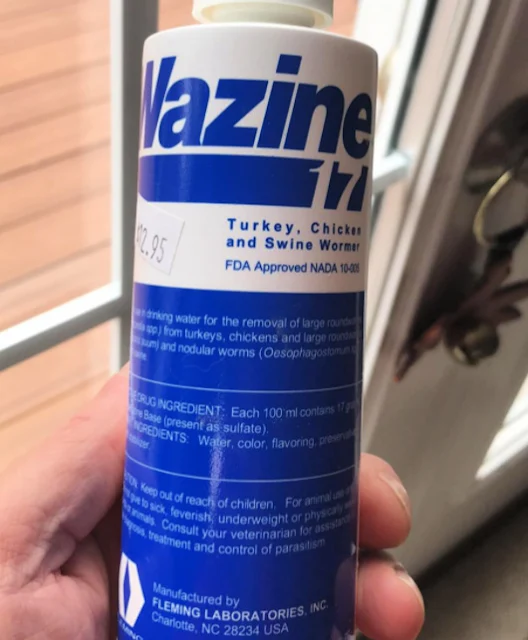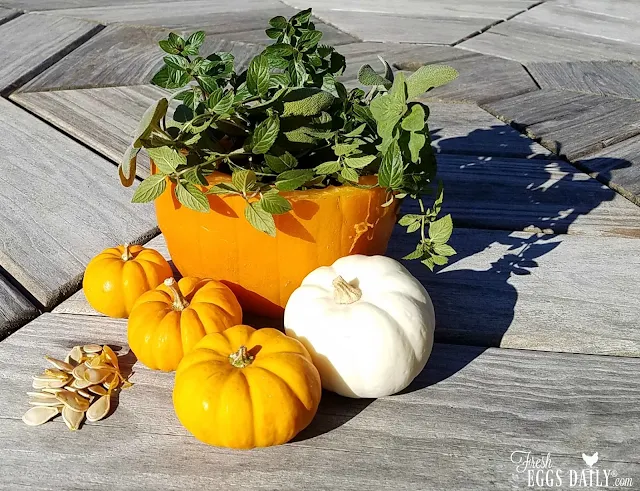Natural Chicken Wormers | Pumpkin, Garlic + Nasturtium
I have never wormed (dewormed?) my chickens with any kind of commercial wormer.
Worming chickens twice a year with a chemical dewormer (that likely requires a period of egg 'withdrawal' during which time period you shouldn't eat the eggs) is NOT necessary.
I also have never had any trouble with worms or internal parasites in my flock. I have had our vet take fecal samples and no sign of worms have been found.
Worming Chickens
While many so-called poultry experts recommend "proactive" worming twice a year, but I don't believe in administering any medications unless absolutely necessary.
The Danger of using Commercial Chicken Wormers
Wazine, a "popular' commercial poultry wormer, actually says right on the back of the bottle "Do not use in chickens producing eggs for human consumption."
That's pretty definitive. It clearly states the Wazine is not to be used for laying hens. Period. No two week waiting period, just flat out do not use on laying hens. Period.
To reiterate, it says "Do not use in chickens producing eggs for human consumption." It doesn't say not for 2 weeks....or 30 days....but never, ever.
Other commonly used chemical wormers such as Ivermectin are NOT approved for use in poultry, and some, like Piperazine only treat a specific type of internal parasites.
As a result, I'm understandably very hesitant to use anything on my chickens with a label like this so instead I rely on holistic preventatives and a natural dewormer for my chickens.Natural Chicken Wormers | Pumpkin, Garlic & Nasturtium
To proactively and naturally protect my chickens from parasite overload, I add a few things to my flock's diet that are believed by many to be natural wormers for chickens and other animals. They act by paralyzing the parasites inside the host animal's body.
I tend to use pumpkin, garlic and nasturtium since I grow all those things in our garden. But there are lots of other plants that are used by many as natural chicken wormers.
Plants Thought to Act as Natural Chicken Wormers
There are a multitude of plants that are thought to act as natural chicken wormers. The idea is that the chickens eat these plants and then the parasites are flushed from the body naturally. These "natural worming" plants include:- Black pepper
- Cayenne pepper
- Carrots
- Chicory
- Cucumber
- Dill
- Garlic
- Hyssop
- Mint
- Nasturtium
- Plantain
- Pumpkin
- Squash
- Watermelon
Used in conjunction with above plants, these natural diuretics/flushes then work to flush any worms out of the host's body:
- Molasses
- Plain yogurt
- Dandelion greens
Even if you don't believe that this will work, there's really no downside to trying it. These are all nutritious "treats" you can offer to your chickens that they will love.
If these plants can help to combat worms and keep internal parasite loads under control, then it's well worth a try. And because all are perfectly healthy and natural, there's no withdrawal period during which you can't eat the eggs your chickens lay.
On a fairly regular basis, I like to chop up whatever I happen to have on hand depending on the season, and then mix everything into a bit of warm oatmeal or scrambled eggs.My chickens love it!
Signs and Symptoms of Worms or Internal Parasites in Chickens
Generally healthy chickens with strong immune systems can generally handle a moderate worm load.
Most backyard (and commercial) flocks likely encounter worms at some point in their life because of the environment they live in and the amount of time they spend poking around in the dirt. It only becomes a problem when the body can't manage the worms and they get out of control.
Signs your chickens might have worms or internal parasites include:
- Visible proof of worms in their droppings which may be foamy or extremely watery
- Dirty feathers around the vent
- Worms in the chicken's eggs
- Pale yolks in the eggs
- Decreased egg production
- Weight loss
- Increased feed consumption
- Fatigue and lack of energy
- Pale comb and wattles
- Ruffled feathers and overall disheveled appearance
When it's Time for a Vet Visit
If you suspect a worm overload, the best thing to do is to take a fecal sample to your vet. Dog/cat vets or your extension service or university poultry science department should be able to test the sample for worms.
If you DO get confirmation of worms, it's best to follow your vet's recommendations as to treatment.
These holistic remedies are best used as preventives to PREVENT an overload and aren't necessarily strong enough to TREAT an infestation.
So back to the natural route....
Pumpkins and other Squash and Melons as Natural Wormers
There are varying opinions on this subject and not much study has been done, but raw pumpkin seeds are thought to be a natural wormer, not only for chickens and ducks, but for sheep and goats as well.
Twice a year, spring and fall, it is suggested that you feed your girls raw pumpkin seeds (ground or whole) free-choice for a week. Which is perfect to coincide with disposing of your Halloween pumpkin.
Ask your neighbors for theirs too!
The pumpkin seeds (as well as the seeds of other members of the cucurbitaceae family such as winter, summer, zucchini and crookneck squash, gourds, cucumbers, cantaloupe and watermelon) are coated with a substance called cucurbitacin that paralyzes the worms.
The larger fruits and vegetables contain higher levels of cucurbitacin, while the smaller vegetables like cucumber contains far less.
Pumpkin "Soup" as a Natural Chicken Wormer
Since pumpkins are plentiful and inexpensive in the fall, that is what I use for my fall worming.You can merely cut a fresh pumpkin in half and feed it to your chickens, or I like to pour some water into the pumpkin half - the ducks really love that! - or fill the halves with some chicken feed to get hesitant flock members to give it a taste.
But I take it one step further and make them a Pumpkin Soup.In a food processor, I grind up the seeds and pulp, then I drizzle in some yogurt, add molasses and garlic - and then pour it into the pumpkin half.
Both the molasses and yogurt will work to cause a bit of diarrhea and help flush the paralyzed worms out of the chickens' systems.
In moderation, both are extremely beneficial when combating internal parasites.
Pumpkin Soup
(serves 8-10 hens)
Blend all the ingredients in your food processor and add enough plain unflavored yogurt to achieve a "soupy" consistency.
Then pour some soup into each pumpkin half, garnish it with shredded carrot and serve it up ! The girls love it !
And when they're done, they will eat the bowl too!
Garlic as a Natural Chicken Wormer
I also add garlic powder to my chickens' daily feed mix every day. My Brewers Yeast with Garlic is specially formulated for chickens and ducks.
Every couple of weeks year round I mince up a whole bulb, mixed with some chopped fresh mint, and feed it to the chickens free-choice and they seem to love it.
Garlic, especially in conjunction with mint is a wonderful year-round natural wormer. I also crush fresh garlic cloves into their water on a regular basis. It's believed that parasites (both internal and external) don't like the taste of blood of hosts that ingest a lot of garlic.Nasturtium as a Natural Chicken Wormer
Nasturtium is a wonderful addition to a natural worming routine, but also a pretty addition to any garden.Nasturtium is not only pretty and easy to grow, it repels insects in the garden. So it makes sense that it also repels poultry pests. My chickens love to eat the leaves and blossoms, which is so good for them because it also acts as a natural wormer, as well as a laying stimulant, antiseptic and antibiotic.
The chickens can (and will) eat the nasturtium leaves, flowers and seeds.
I plant some nasturtium in my garden each spring and am thinking of planting around the perimeter of the run next year for the chickens to eat at will.
Watch my Nasturtium video in the Herbs for Hens series to learn more about Nasturtium.
Scientific Proof Regarding Natural Chicken Wormers?
Although there isn't too much information or scientific evidence out there to prove or disprove the ability of these holistic preventatives to combat intestinal worms, there have been a few studies done that point to their effectiveness. I'm a believer.
Additionally, pumpkins contain antioxidants, as well as high levels of Vitamin A, both of which strengthen immune systems and help the chickens better combat illness.
The beta carotene in the pumpkins contributes to vibrant orange egg yolks as well as bright orange bills and feet on our ducks.
Another substance in the pumpkin, phytosterol, is thought to lower cholesterol, so I believe it probably makes our eggs lower in cholesterol as well.
Bottom line, the pumpkin and garlic, as well as other types of squash and melons and the nasturtium, are nutritious, so I figure there's no harm....and besides, we've never had any problem with any kind of intestinal worms in over a decade.
Here's a great article on the same subject written by herbalist Dawn Combs for Hobby Farm magazine.
Important to Note | While natural preventives might be effective to PREVENT, if you have a vet-confirmed case of a parasite overload, I would recommend treating it with a commercial product. There is an all-natural worming product called Backyard Chicken Zyfend that is available HERE.












.jpg)























